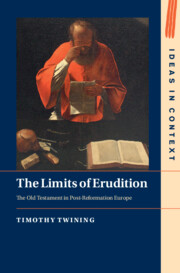Refine search
Actions for selected content:
11 results
Everyday Erudition: John Locke, the Bible and the Challenge of Early Modern Biblical Scholarship
-
- Journal:
- Transactions of the Royal Historical Society , First View
- Published online by Cambridge University Press:
- 11 September 2025, pp. 1-25
-
- Article
-
- You have access
- Open access
- HTML
- Export citation
Chapter 3 - Deconstructing (and Reconstructing) the United Monarchy as Historical
- from Part I - The United Monarchy in the Bible and Contemporary Scholarship
-
- Book:
- The Bible's First Kings
- Published online:
- 16 January 2025
- Print publication:
- 20 February 2025, pp 59-106
-
- Chapter
- Export citation
Chapter 2 - Untangling the Threads of the Biblical Account with Literary Critical Scholarship
- from Part I - The United Monarchy in the Bible and Contemporary Scholarship
-
- Book:
- The Bible's First Kings
- Published online:
- 16 January 2025
- Print publication:
- 20 February 2025, pp 20-58
-
- Chapter
- Export citation
Conclusion
-
- Book:
- The Limits of Erudition
- Published online:
- 05 December 2024
- Print publication:
- 12 December 2024, pp 291-302
-
- Chapter
- Export citation
Introduction
-
- Book:
- The Limits of Erudition
- Published online:
- 05 December 2024
- Print publication:
- 12 December 2024, pp 1-23
-
- Chapter
- Export citation

The Limits of Erudition
- The Old Testament in Post-Reformation Europe
-
- Published online:
- 05 December 2024
- Print publication:
- 12 December 2024
3 - Herodotus, Historian of the Hebrew People, Without Knowing It
- from Part I - Antiquity’s Modernity
-
-
- Book:
- Victorian Engagements with the Bible and Antiquity
- Published online:
- 28 September 2023
- Print publication:
- 12 October 2023, pp 47-80
-
- Chapter
- Export citation
1 - Life and Intellectual Development
- from Part I - Grotius in Context
-
-
- Book:
- The Cambridge Companion to Hugo Grotius
- Published online:
- 03 September 2021
- Print publication:
- 16 September 2021, pp 17-44
-
- Chapter
- Export citation
Conclusion
-
- Book:
- The Origins of the Bible and Early Modern Political Thought
- Published online:
- 02 March 2021
- Print publication:
- 18 March 2021, pp 177-184
-
- Chapter
- Export citation
27 - The Bible in Protestantism from 1750 to 2000
- from Part IV - Reception of the Bible Confessionally
-
-
- Book:
- The New Cambridge History of the Bible
- Published online:
- 09 June 2015
- Print publication:
- 13 April 2015, pp 563-586
-
- Chapter
- Export citation
15 - THEODORE OF MOPSUESTIA AS REPRESENTATIVE OF THE ANTIOCHENE SCHOOL
- from V - THE BIBLE IN THE EARLY CHURCH
-
-
- Book:
- The Cambridge History of the Bible
- Published online:
- 28 March 2008
- Print publication:
- 01 April 1970, pp 489-510
-
- Chapter
- Export citation
